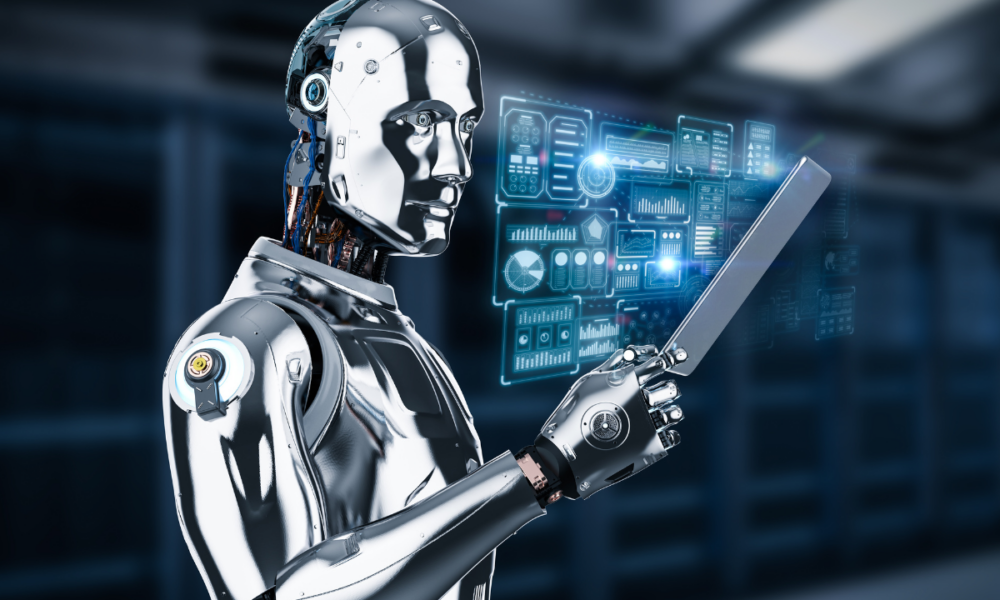Exciting efficiency gains ahead
The capabilities of artificial intelligence (AI), especially those that are based on large language models (LLMs) such as ChatGPT, continue to amaze consumers and professional users alike.
LLM AIs are general-purpose, like a multi-tool, useful for various tasks but not optimised for specific goals. RecTech AI tools are more dedicated, designed to excel at recruitment tasks like screening CVs or scheduling interviews.
First and foremost, AI is an efficiency enabler. However, there is a lot more to it than saving time and effort. Here we discuss some areas of recruitment and HR technology where development using AI is blazing a trail towards a more technologically sophisticated future.
Talent acquisition: Hiring new workers
AI is transforming recruitment by automating tasks and leveraging data for better decision-making. Here are some key applications of AI that are currently deployed to make new hires:
- Sourcing and screening
AI-powered tools scan CVs and online profiles to identify qualified candidates based on skills and experience. Filtering out irrelevant applications, saves recruiters an enormous amount of time, as many applications are speculatively hopeful.
- Pre-employment assessments
AI can deliver standardised assessments evaluating job-specific skills, cognitive abilities, or cultural fit through simulations or role-play experiences.
- Chatbots and virtual assistants
AI-powered assistants can answer candidate inquiries 24/7, schedule interviews, and provide feedback on applications, freeing up recruiters for strategic tasks.
- Interview Analysis
AI analyses video interviews, identifies keywords and sentiment, and is capable of assessing a candidate’s soft skills like communication or problem-solving.
However, the race is on to develop the next wave of AI-enhanced RecTech tools for search and selection. Some of the likely ways AI will be used in the future include:
- Predictive analytics
AI will be able to analyse past hiring data to predict successful candidate profiles and identify potential risks like turnover. The potential even exists for AI to be able to understand the thoughts of candidates!
- Personalised candidate journeys
AI can tailor the recruitment process based on candidate or hirer preferences, offering personally tailored communication and interview formats.
- AI-powered interviewing
Expect advanced AI systems to conduct initial interviews, assessing technical skills and basic qualifications, allowing human interaction for deeper evaluation.
- Unconscious bias mitigation
AI is likely to be used to analyse job descriptions, interview questions, and selection criteria to pinpoint any instances where bias has inadvertently crept in, helping to ensure fairness of hiring practices.
Employee performance: Assessing existing workers
For new hires and existing workers, AI offers a whole new level of employee performance management by streamlining administrative tasks and offering data-driven insights. Here are some of the main ways that AI is currently used for assessing existing workers:
- Performance monitoring
AI is able to analyse data from various sources, such as CRM systems and project management tools, to track key performance indicators (KPIs). From things like role-specific parameters to tracking attendance, clocking workers on and off, monitoring breaks, and timesheet verification of temps and contractors, AI identifies areas for improvement.
- Skills gap analysis
AI is used to analyse employee profiles and past performance data to recommend training opportunities, helping bridge skills gaps and enhance workforce capabilities.
- Sentiment analysis
Text analysis tools are capable of gauging employee sentiment through examining surveys, emails, or internal communication platforms, potentially revealing concerns or areas for improvement in company culture.
- Performance feedback tools
AI-powered platforms can deliver automated feedback based on established performance metrics and codes of practice, offering a consistent and data-driven approach.
As with search and selection, the race is on to develop the next wave of AI-enhanced RecTech for human resource management. It is likely that in the not-too-distant future, AI will enable a more integrated approach to employee assessment through:
- Personalised development plans
AI could analyse data and suggest personalised learning paths based on individual performance and skill gaps, promoting CPD through learning and growth.
- Predictive performance analytics
AI can predict potential performance issues or employee churn risks based on various data sources, allowing for proactive interventions and support.
- AI-powered coaching and mentoring
AI-powered platforms could offer personalised coaching or micro-learning modules based on individual needs, providing real-time support and feedback.
Automated performance reviews
Advanced AI could potentially conduct self-evaluations and generate draft performance reviews, streamlining administrative processes while allowing for human oversight.
Rapid growth and progress but concerns still persist
However, the rate of development and the pace of change in the real world is happening at breakneck speed. For example, 35% of global companies use AI, and approximately half of businesses plan on incorporating AI into their processes during 2024. The uptake of AI outstrips the capability of governments and regulators to keep up. As a result, concerns are deep-seated and are not going to go away.
In the case of search and selection, the fear is that AI is only as good as the data and that such systems are not nuanced enough to make soft judgement calls on matters such as personality and cultural fit. For the purposes of using AI as a component of Human Resources management, transparency and clear communication are crucial to avoid concerns about employee monitoring.
Whatever the intended purpose, where AI is used to evaluate people, the fear of bias and discrimination is also never far away. The key concerns about AI in recruitment and HR include:
- Bias in facial expression analysis
AI systems analysing facial expressions during interviews can be biased, especially for non-white candidates. Algorithms trained on data sets that lack diversity may misinterpret cultural expressions such as nervousness or lack of confidence, creating unfair disadvantages for qualified individuals.
- Inaccurate age estimation
AI-based age estimation tools can be inaccurate, particularly for older workers. This can lead to filtering out highly skilled and experienced candidates based on an arbitrary metric. Age discrimination is a serious concern, and there needs to be safeguards to ensure that AI does not perpetuate it.
- Privacy concerns
AI-powered monitoring of employee activities, including work hours, communication, and even facial expressions, raises privacy concerns. Employees may feel like they are constantly under surveillance, impacting morale and trust. Clear guidelines and transparency are crucial when implementing AI for employee assessment.
- Over-reliance on data
AI decisions are only as good as the data they’re trained on. Biased data sets can lead to biased outcomes. HR professionals need to critically evaluate the data used in AI tools and be prepared to intervene when necessary.
- Lack of human touch
AI can’t replicate the nuanced understanding humans bring to recruitment and HR. Gut feelings, cultural fit, and interpersonal chemistry are all important factors that AI may struggle to assess. Over-reliance on AI may lead to sterile, impersonal hiring practices that miss out on top talent.
Recruitment agencies deliver better value with ETZ
AI promises a brighter future. However, to see this realised in a way that allays concerns and avoids the criticisms of its detractors, AI needs to be embraced responsibly.
As one of the sectors on the leading edge of AI-tool development and adoption, the recruitment and HR community is well-positioned to build more efficient, data-driven, and equitable hiring and performance assessment processes for the future.
ETZ‘s leading recruitment back office software solution streamlines the back office processing of your recruitment agency. Our complementary solutions to our leading timesheet and invoicing solution are ETZ Comply for onboarding and document management and Caspian for business intelligence. These give agencies further capability to streamline and uncover opportunities.
To find out more call us on 0800 311 2266 or book a demo.





